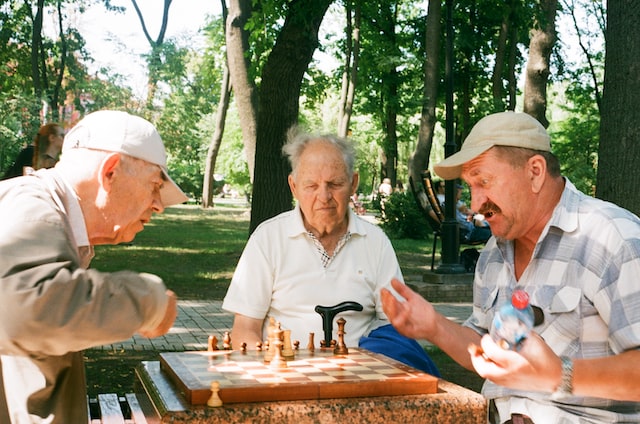21 Greatest Regrets Most People Have at Old Age Which You Must Avoid

Old age is full of memories both good and bad based on how one spent his early life. Looking back over one's life may lead to finding oneself wishing to have made different choices or done things differently. Unfortunately, the regrets people experience in life can become more pronounced as they get older and this can lead to feelings of sadness and regret.
It is important to remember that there are certain regrets that are more common than others and it is possible to take action to avoid them. By becoming aware of the greatest and most common regrets people have at old age, we can be more mindful of our choices and strive to live a life with fewer regrets.
In this blog post, we will list and discuss on some of those greatest old age regrets and offer suggestions on how you can avoid them to live a fulfilled life.
Below are the Greatest Regrets Most People Have at Old Age, Which You Must Avoid at All costs

1. Not optimizing the time they had with friends and family:
When we're young, we often take for granted the value of our friends and family, and don't take the time to truly appreciate them. We become so busy with our own lives that we forget to make time for those closest to us. This can lead to feelings of regret and sadness as we age, and we find ourselves wishing we had taken the time to enjoy their company more.
Besides, when we encounter people daily, such as friends, colleagues, family, and loved ones, we tend to think we will see them again. However, the truth is that most of the people we meet today may never cross our paths again. As people reach old age, they often miss many of their loved ones who have passed away or disconnected, and the fact that they will never meet them again.
Moreover, when children are grown, they leave their elderly parents alone and sometimes in the care of others. Many of these children may not have the chance to spend time with their parents again, leaving the elderly with a feeling of regret for the time they didn't have with their friends and families.
It is therefore important to spend as much time with family, loved ones, and friends as possible and create memories that will be remembered fondly. Failure to do this can lead to feelings of regret and sadness as we age, and we find ourselves wishing we had taken the time to enjoy their company more. Spending time with your family is one of the best ways to have a happy family.
2. Failing to capitalize on chances:
There is no one who hasn't come across a good opportunity for his entire life. People often lose great chances because of negligence, bad attitude or other self-induced factors, and most of such loss end in regret.Losing a chance in life often sound lighter when one is still young because there is this "I still have time" mindset. Nonetheless, as age draws to a close, there is bound to be a reflection on the numerous opportunities one lost in early life, especially if such opportunities had never come again. This makes it one of the greatest and most common old age regret.
3. Failing to prioritize good health early in life:
Good health is one of the most important things in life. Ignoring one's health often end in regret. When one is young, he/she may not feel the implications of the unhealthy lifestyles he/she lived.When you don't prioritize good health early in life, you may end up regretting it when you reach old age because that is when people begin to pay for the health risks they took at early adulthood.. Without taking steps to maintain your health, you may find yourself dealing with chronic illnesses and other ailments that can greatly reduce your quality of life.
In addition, you may be unable to participate in activities you used to enjoy due to a lack of strength or stamina. This can lead to feelings of regret and sadness, knowing you could have made different choices to ensure a healthier life for yourself. Taking the time to prioritize good health early in life can help you avoid this regret in the future and remain strong and healthy even at old age.
4. Not saving enough money while actively employed:
While dedicating time into work and professional engagement, most people often forget to save money for the future. When old ages arrives and retirement sets in, they realize that they did not have any savings to sustain them.When you are retired and don’t have a steady income, it can be difficult to make ends meet if you haven’t saved enough. You may find yourself in a situation where you have to rely on Social Security payments or other limited sources of income, and this may not be enough to cover your basic needs.
Additionally, not saving enough money while employed could mean that you don’t have enough money saved for travel or other activities that you may have wanted to do in retirement. This can lead to regret, as you may feel that you have missed out on opportunities and experiences that you could have enjoyed if you had saved more.
5. Failing to take lessons from past errors:
The end of a man's life is full of so much memories from childhood to teen, early adulthood and old age. In every phase of life, one is prone to making mistakes. while some mistakes can easily be forgotten, some cannot easily vanish in forgetfulness.When we are younger, we are often more focused on the present, not thinking about how our actions today will affect our lives in the future. As we get older, it becomes more difficult to make up for the mistakes we made in the past. We may have lost relationships, wasted time, or failed to seize opportunities. This regret can be difficult to cope with, as we can’t go back and change things.
One error that easy go away are the ones one made more than once. Making one mistake in life over and over again often replay at old age and the consequences of such mistakes often leave a scar of regrets that follows one to the grave. It is important to learn from our mistakes while we are still young so that we can avoid this regret in later years.
6. Neglecting to nurture relationship and connections:
At youthful days, many engage in daily activities that they forget to invest in their relationship with others, some even become so busy that they fail to care about their immediate families.
Investing in relationship means adding values to the people you have around you by creating bonds with them, assisting them, partnering with them and creating good connections.
When one does not invest in relationships through negligence, the repercussions often come at old age. This is because when old age sets in, they realize that most people they thought were there by them as work colleagues and comrades were not genuine. This often leave old people in a situation whereby there is no more trusted friend or partner in life, and sometimes a family who do no care.
"The older you get, the less friends you have, and the few that remain are those worthy to be there."
7. Not enjoying life to the fullest:
The taste for many things goes down. Passion for food, drink, outings, friendships, and other things diminishes at old age. At this time, most old people only have the memories of the good times they had in life, their best dinners times, shows attended and strange food they tasted.Not taking the time to explore hobbies, travel, or make meaningful connections can leave us feeling a sense of emptiness. We may wonder what our lives would have been like if we had stepped outside of our comfort zones.
Taking the time to appreciate life and savor every moment can help us to avoid feeling regretful as we age. However, when there was no good time to recall, it is always a matter of regret about the life one wasted without enjoying it to the fullest.
8. Failing to allocate resources by investing in business:
The only thing that can sustain the aged through periodic income flow is the business they have invested in. Even though family members may be so caring as to provide for everything, without personal money inflow there will still be a feeling of dissatisfaction, let alone when no one cares.
As money loses value every day, saving may not be a promising preparation for retirement; instead, investing is a better alternative, especially if it is well managed, as it can always bring a reliable income flow over savings. Unfortunately, many people only realize this at an old age, leaving most old people who worked for years without owning a personal business to regret their decisions.
Owning a business is not just about the income; after retirement, what affects some people more is inactivity, which can lead to sickness or even early death. Engaging in personal business activities at old age even after retirement is a great way to stay active and healthy.
9. Not preparing for the old age challenges:
Many old people end up finding themselves not preparing for the challenges and uncertainties that await old age. They did not invest in it nor make proper planning about how they are going to eat or survive when everything turns into sunset. Not anticipating the physical and mental changes that come with old age as can mean that you are in for a shock when the time arrives.One of the regrets in this aspect is failing to plan for retirement which comes with severe monetary repercussions at old age. Not having a retirement plan or savings can also lead to financial stress and make it difficult to enjoy the freedom and relaxation that comes with retirement. Neglecting to plan for medical and long-term care needs can also mean that you will not have the support you need when you need it the most.
No matter how much one invests in children and supporting others, a pay-back is not promising. People who think their children or partners would take care of them at old age without planning other alternatives of survival often end up regretting at last. Taking the time to prepare for old age challenges now can help to prevent the regret that comes with not planning for the future.
10. Frittering away one's youth:
As a young person, it can be easy to get caught up in the moment and take life for granted. All too often, young people make decisions that can have lasting consequences, such as skipping school, partying too much, or neglecting personal responsibilities. These choices can lead to missed opportunities, strained relationships, and financial hardship.
When one grows old, the perspective they have about life changes and most people often come to realize how much they wasted their youthful days on things that didn't matter in life. It can be difficult to come to terms with the lost time and potential that could have been achieved. To avoid this regret, it is important to make thoughtful decisions in youth that will benefit one in the long run.
11. Sacrificing one's own joy for the benefit of someone else:
It is good to make sacrifices to others but always dedicating to others at the detriment of oneself can end in regret.Ignoring personal happiness to please others can lead to feelings of bitterness and emptiness that can take a toll on emotional and mental health. This regret can be compounded when one realizes that they may have been able to enjoy a more fulfilling life if they had just taken the time to care for themselves instead of pleasing people who would not add any value in the end.
12. Not putting trust in one's gut feeling or intuition:

Making decisions based on evidence and thoughtful consideration while ignoring personal instinct can lead to old age regret. It can be easy to ignore our intuition and simply go with the flow of life, but this can be a mistake.
Not trusting your gut feeling or intuition can have a negative impact on the decisions you make, your relationships, and ultimately your life. When you don’t trust your intuition, you may find yourself in situations that are not ideal, or even dangerous.
It is important to remember that your intuition is a source of knowledge, and it is there to protect you and serve you. When you take the time to listen to it, and make decisions that align with it, you can trust that you are making the right choices for yourself. Yourself whispers some words of advice that can lead you to a happy ending. Ignoring that whisper can lead to regret in life.
13.Being too cautious and avoiding taking risks:
At old age, it can be easy to look back on our lives and regret the risks we didn’t take when we were young. Being overly cautious and avoiding taking risks can lead to missed opportunities that can never be recovered. We may find ourselves wishing for a different life, one filled with more excitement and adventure.It is important to take risks, even small ones, in order to expand our horizons and experience all that life has to offer. Taking risks can open up new possibilities and bring forth opportunities that may not have been available otherwise.
It is never too late to start taking risks and embracing life’s potential. By doing so, we can ensure that we don’t look back on our lives with regret in our later years.
14. Getting old without leaving a lasting impression of legacy:
We do not exist just for no reason. Even plants have purposes and contribution to the world and the ecosystem. We live to impact our families, communities, societies, country and the world at large. We can only create this impact by leaving a legacy that we would be remembered for.Old people who haven't done more to leave a lasting impression of their legacies often end in regret. They may have spent too much time on our own pursuits and not enough time investing in something that will have a lasting impact on our communities or the world.
We may have taken for granted the opportunities that life presented us instead of using them to their fullest potential. The reality is that our time on this earth is limited, and if we don't take steps to leave a lasting impression of our legacy, we may find ourselves looking back with regret.
15. Failing to pursue one's passion and dreams:
Regretting not chasing ambitions earlier in one's life is rampant among old people. At youth the major focus is on making money and sometimes at all cost and from any source, but when one grows older, there seem to be a more in-depth thoughts about one's lifestyle, work and daily engagement.
Irrespective of the amount of money and gain a certain profession or work brings, only those who stay to their passions find the best joy in what they do. Although one can develop passion to a job, pursuing a passionate dream and succeeding exceedingly in it is the key to a lasting happiness and optimism in life. When old age comes, there is always a passion for abandoning one's passion to a life that was forced upon oneself by the society or people who would not be there forever.
16. Living life with an overly serious attitude:
Living life with an overly serious attitude can be detrimental to a person's overall wellbeing. Taking life too seriously can lead to a person missing out on life's joys and opportunities, and can also cause them to focus more on the negative aspects of life.This type of attitude can lead to a feeling of being overwhelmed and exhausted, as we constantly strive to achieve perfection in all areas of our lives. This can lead to a lack of enjoyment and appreciation for the simple things in life, and an inability to relax and enjoy the journey.
As people get old, they may regret not taking more risks, not spending more time with family and friends, or not taking time to enjoy life's simple pleasures. Living an overly serious life can lead to a life of regret and unfulfilled dreams of a life surrounded with pleasures and fun.
Note: This does not mean that you should take life for granted, instead it tells the need to know when to work, when to play, when to smile and when not to laugh. Understanding this does not only make you feel better but it helps you mold a better personality.
17. Being assertive in one's own beliefs and opinions:
It is especially easy to regret decisions we have made when it comes to standing up for our beliefs and opinions. This is because most of the things you were afraid of would not be a thing of concern anymore at old age.Being assertive can be difficult, and often times when we fail to stand up for ourselves, we can look back on that missed opportunity with regret. There is a prolonged sense of guilt when you fail to stand up for the truth and your belief.
It is important to remember that it is never too late to stand up for what we believe in and to make sure our voice is heard. By being assertive and standing up for our beliefs and opinions, we can ensure that we will not look back on our lives with regret.
18. Not setting aside time for contemplation and reflection:
If we don’t take the time to pause and reflect on our lives, we risk looking back with regret when we get older.We may wonder why we didn’t take the time to pause and consider our choices and the impact they had on our lives. We may regret not having the opportunity to think through our decisions before making them and the consequences that may have come with them.
As we get older, the importance of taking time for contemplation and reflection becomes even more important, as it can help us to make better decisions and to avoid regret when we look back on our lives.
19. Not having children early in life:
Most of the old people we have spoken to about what regret they have in life point out this as one of their regrets. While some do not open up about their regrets for privacy sake, many of them think they would have been relieved from family responsibilities earlier as it been they marry earlier and have children early.Not having children early in life can often lead to feelings of regret later in life. As we age, our bodies may no longer be able to handle the physical demands of pregnancy and childbirth, making it impossible to start a family. Many people realize that they are not able to provide the same level of support and attention for older children that they could have when they were younger.
Moreover, the feeling of emptiness that comes with not having children can be particularly strong as we reach our golden years and watch our friends’ children grow up. For those who are not able to have children, it is important to find meaning and purpose in life through activities such as volunteering, travel, or hobbies. Doing so can help to fill the void left by not having children and create a sense of fulfillment in the later years of life.
20. Failing to improve financial literacy and resource management:
If one has failed to improve their financial literacy and resource management, they may find themselves in old age regret.Without the proper understanding of how to save, budget, and invest, one may have failed to save for retirement or other future goals, leaving them without the resources necessary to live comfortably in their golden years.
Lack of proper financial management causes one to spend frivolously or invested poorly, leading to a lack of desired financial security. To avoid regret, it is important to gain the knowledge necessary to make smart financial decisions.
Without the knowledge of how to make the most of your money and resources, you may find yourself in a financially tight spot as you reach retirement age. This can make it difficult to maintain the same lifestyle you enjoyed in your younger years, or to make the most of your retirement. Investing in your future now can help you to avoid the regret of not taking better control of your finances and resources in the past.
21. Accepting to marry the wrong person:

We have heard of stories where DNA tests reveal a bad outcome when the supposed father is already in his 80s. Moreover, a lot of people realize at old age that they were only marrying themselves and that their partners were only there because they were still actively young.
Old age is a period when beauty, strength and vanities fade away. What sustain two individuals go beyond those things that young people prioritize. What matters at that stage ae the things you might have ignored when you were still young. This has made a lot of old people wish they were married to better persons they have met in life.
To avoid this regret, it is important to think about what would come of you and your partner when you both get older. You can lead our previous article on marital compatibility factors to make you have a better decision that would save you from regret. Another factor that leave some is regret and at old age include divorce divorce or losing one's spouse to death.
In conclusion, getting old is one of the greatest thing that can happen in a man's life because millions are not privileged to reach old age. It is a golden period to rest, relax and savor the fruits of your labor. Being an old person does not mean that your life is short, after all, "old age" to many may mean "a retirement age" which in some parts of the world begins from 60 years of age. If you have 120 years to live, it means at 60 you still have another 60 years left. Therefore, irrespective of how old you become, you can still make amendments, reconcile with your family, reconnect with old friends and see how you can invest your retirement benefits to help you sustain your remaining years on earth. This article, however, expresses the need for early planning and preparation for old age to avoid regret. The truth is that without planning, regret is inevitable when life turns blue.






